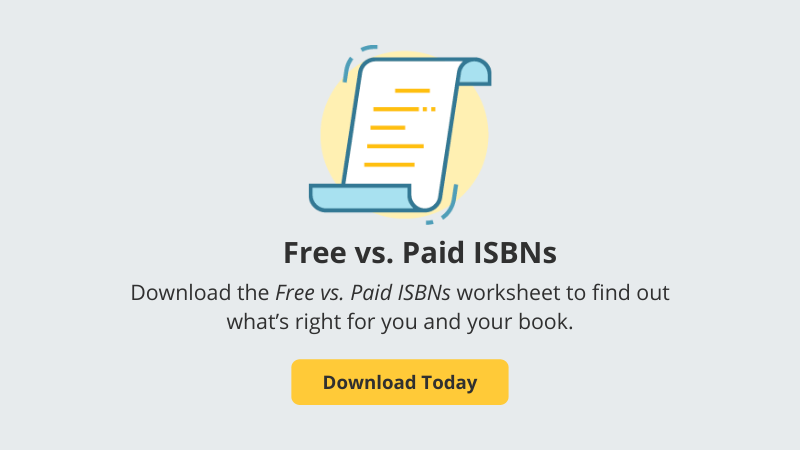There are millions of books in the world, with more being published and distributed every day. The only way to keep track of them is with unique identifiers, which we call International Standard Book Numbers, or ISBNs. Each format of a book should have its own ISBN—its unique identifier that belongs only to that title and format—so that customers and retailers can place an order for the exact book they want.
ISBNs: A Brief History
The Standard Book Numbering (SBN) system was established in 1966 and implemented the following year when W. H. Smith (the largest single book retailer in Great Britain) decided to move to a computerized warehouse and developed a standard numbering system for their inventory. Not long after, other countries desired to adopt the system for international use, which soon led to the birth of the ISBN, which was made standard in 1970. Today, ISBNs are used in more than 150 countries.
ISBNs originally consisted of 10 digits but was updated to a 13-digit format in 2007 to increase the capacity of the ISBN system. These ISBNs started with the prefix 978, and each one of these ISBN-13s had an equivalent ISBN-10 to match it, making the ISBN-13 backwards-compatible. This allowed systems that were already set up using ISBN-10s to continue to stock and sell books with ISBNs in a 13-digit format without making any updates. You can find your equivalent ISBN-10 or ISBN-13 using this converter through Bowker: https://www.isbn.org/ISBN_converter.
Change Happens, And It Ripples
In 2019, Bowker, the United States ISBN Agency, announced plans to use a new prefix, 979, due to diminishing inventory of 978-ISBNs. There are only so many unique combinations to be made from one prefix, so it became necessary to issue a new one. However, this new 979-prefix does not have an equivalent ISBN-10 associated with it—it is not backwards-compatible and cannot be converted into an ISBN-10 counterpart.
Since Bowker started assigning 979 prefixes to 13-digit ISBNs, the industry standard moving forward is changing so that all systems must identify titles using only their ISBN-13 format. When Bowker made the announcement, the 979 prefix was already in use in France, Italy, and Korea. With more international use, ISBN-10s are now truly outdated.
This new standard means that any systems still using ISBN-10 identifiers to distribute, stock, and/or sell books will need to be updated to comply with this new industry-wide expectation. For some retailers, migrating their systems to ISBN-13 may be an overly complex and major undertaking—remember how we mentioned there are millions of books in the world? But they’ll have to make this update if they want to remain relevant.
How Does This Change Affect Me As An IngramSpark Publisher
Because many retailers have already updated their systems to identify books exclusively by their ISBN-13 format, titles beginning with a 979-ISBN can still be sold in the marketplace, and IngramSpark can and will distribute them to all our partners.
If you are concerned about retailer ordering issues and you are a publisher in the US with a 979-ISBN, you may consider some alternatives:
Order ISBNs In Bulk
If you plan on releasing at least 3 unique books or formats, it is worth it to consider purchasing ISBNs in bulk—you can get a 10-pack for $295, making each ISBN less than $30, compared to the individual price of $125 per ISBN through Bowker’s website or $85 through IngramSpark (available in the US only).
Use A Free ISBN From IngramSpark During Title Setup
US customers who opt to receive a free ISBN from IngramSpark will be assigned an ISBN-13 beginning with the 978 prefix for now. Before deciding to publish your book using a free ISBN from IngramSpark, however, please keep in mind the following stipulation: because IngramSpark owns the ISBN, the imprint associated with the free ISBN is an “Indy Pub.” This means that your publishing name may not be attached to the book, as many retailers will default to the imprint, rather than the publisher's name, when listing a title on their websites.
Diversify Your Readers Buying Options
On any titles you have listed with a 979-prefix ISBN that is experiencing availability concerns, we strongly suggest informing your readers to order from other retailers available like Barnes & Noble, Books-A-Million, and even Bookshop.org. For availability in the UK, try Gardners and Waterstones, or Amazon UK.
Looking Forward
There are so many unique stories to be told, so we know that ISBNs will continue to be in demand. While the future is often unpredictable at times, it is likely that more eventual change will need to occur within the industry as the 979-prefix becomes established.
What is certain today is that using the ISBN-10 identifier is becoming quickly outdated, and retail platforms that have not yet made the upgrade to using ISBN-13s exclusively should be feeling the pressure to make that update to their systems soon. In the meantime, consider options to find 978-ISBNs to ensure your title can be available with the most retailers possible. If you have a 979-ISBN, direct your customers to retailers who have made the update and carry your book in their stores or on their websites.
Works cited:
https://www.bowker.com/en/products-services/isbn-us/
https://www.isbn.org/about_isbn_standard
https://www.isbn-international.org/content/changes-united-states-isbn-prefixes
https://bisg.org/news/479346/New-979-ISBN-Prefixes-Expected-in-2020.htm
https://www.loc.gov/publish/pcn/isbncnvt_pcn.html








